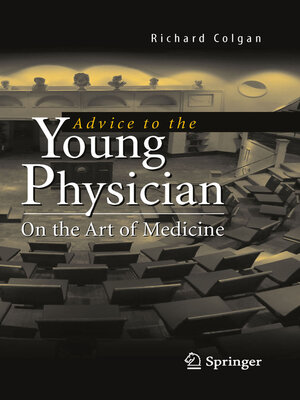
Sign up to save your library
With an OverDrive account, you can save your favorite libraries for at-a-glance information about availability. Find out more about OverDrive accounts.
Find this title in Libby, the library reading app by OverDrive.



Search for a digital library with this title
Title found at these libraries:
| Library Name | Distance |
|---|---|
| Loading... |
Advice to the Young Physician introduces the origins of important teachings that form the basis of medicine as it has been taught by some of history's greatest educators in medicine. Advice to the Young Physician reveals how to make the transition from technician to healer.
This book reinforces the humanistic side of patient care, which is often overshadowed by the focus on highly technological elements. Medical students, residents, fellows, physicians, and allied health practitioners often forget the intricacies of the genomic makeup of adenoviruses, yet they remember the tips, anecdotes and aphorisms related by mentors, educators, and experienced physicians. The art of medicine comes from insights gained from unique and dynamic experiences between the physician, an enthusiastic medical student and the human patient, and is rarely found in books or taught in a universal and systematic way.
Advice to the Young Physician provides numerous examples of best practices in order to internalize and practice the art of medicine, including tenets taught by Hippocrates, Maimonides, Osler, Peabody, Schweitzer and others.
Advice to the Young Physician targets aspiring and new physicians with the intent to make them better physicians. It hits the mark. An effective mix of the writings of some of medicine's giants, as well as clinical experiences of the author, the book offers an historical framework and personal context to understand the attributes and attitudes of the good physician. It is a quick read that rewards the reader with a sampling of 4000 years of medical wisdom sprinkled with practical advice for the modern day doctor.
—Richard G. Roberts, MD, JD, Professor of Family Medicine, University of Wisconsin School of Medicine and Public Health, President World Organization of Family Doctors, Past President American Academy of Family Physicians
This is a small book and easy to read. Itcomprises several inspiring sketches of ancient and modern physicians whose reputations were based as much on their dedication to the humanism of medicine as it was to the science of medicine. Those who teach medical students and residents will find it a good source of medical history that, besides being important in itself, will add a new dimension and a little lightness to morning rounds.
The author makes it clear that in our era of high technology it is easy to underestimate the importance of uniting humanism with science in caring for the sick. He also provides some practical information on such topics as how to present a case to attending physicians and how to communicate well with patients. The ancient physicians that history remembers were not only astute observers of signs and symptoms but also were deeply concerned about the psychological health of their patients and how disturbances in their emotional health often manifested
in physical symptoms.
Colgan starts with Hippocrates and Maimonides whose names many young physicians are familiar with. The former for the aphorism "first do no harm" and the latter for being one of the first to call medicine a "vocation" and a "calling."
The following "greats" are included in the book:
Dr Albert Schweitzer whose "reverence for life" led him to his missionary medical work in Africa. He wrote Out of My Life and Thought and received the Nobel Peace Prize in 1952.
Sir William Osler (1849–1919), known to some as the father of internal medicine, was a respected physician and teacher. He was the author of the Principles and Practice of Medicine, used for decades as the bible of medicine. But his fame rested equally on his dedication as a mentor...







